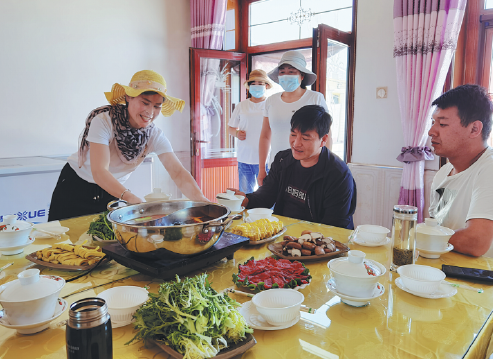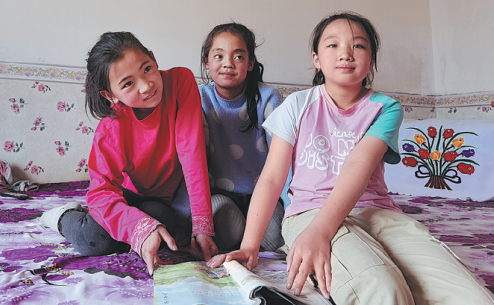In harsh, remote Ningxia, cooperation makes a difference
The Ningxia Hui autonomous region takes big leap in poverty reduction, lifting 103,000 people out of poverty last year.
As China's five-day break began on May 1, many workers were busy making face masks for schoolchildren at Ningxia Quanxiang Outdoor Textile Products Co in Jingyuan, a county in the Ningxia Hui autonomous region.
Huang Shuihai, the company's president, had moved the headquarters from Xiamen, a coastal city in Fujian province in Southeast China, to Ningxia in the northwest in June last year. That was a win-win move for Huang-and for Jingyuan county, where the company's new headquarters is located.
Unlike Xiamen, where labor costs were rising, Jingyuan county has legions of less expensive laborers who now earn more than they did before.

Jingyuan county is in Xihaigu prefecture, one of China's most impoverished areas. In 1972, the United Nations called it "one of the least suitable areas for human habitation in the world". Xihaigu has a chronic shortage of water and a harsh climate.
Xihaigu is among the last, and arguably most difficult, hurdles in achieving the national goal of eliminating absolute poverty and building a moderately prosperous society in all respects by the end of this year.
With the move to Jingyuan, Huang joined the local poverty alleviation campaign, building factories in several villages and recruiting 500 local residents. One of the factories produces 80,000 to 100,000 masks a day with plans for 500,000 to 700,000 in the future.
Since the mid-1990s, the pairing of China's more developed eastern regions with less-developed western areas has been a key institutional arrangement in the war on poverty and has helped to bridge the previously widening wealth gap between these regions.
East-West cooperation has shown itself as an effective platform for advancing both economic growth and social stability. Cooperation helps develop regions that were previously left behind and increases opportunities for economic growth by expanding domestic demand.
Equal development
More equal development of eastern and western regions also corresponds to the national agenda. Cooperation is therefore considered a common responsibility and obligation of localities throughout the country.
Fujian province is paired with Ningxia and is obliged to offer support for the northwestern region. Huang was encouraged by Fujian officials to relocate his 10-year-old company, which produces a wide range of bags-backpacks, handbags, school bags, duffel bags and army bags-to Ningxia. They are sold in Europe, the Americas, South Africa and Japan.
Unlike some companies that cooperate by building satellite workshops in western areas but keep their headquarters in eastern areas, Huang put his entire operation, both headquarters and factories, in Ningxia.
Many villagers in Jingyuan county now do not have to travel to faraway places for jobs. They can stay home as they lift their families out of poverty.
Ma Caiqin was the first person Huang recruited in Jingyuan county. A housewife before joining the company, Ma is now in charge of the human resources department. She has a monthly salary of more than 4,000 yuan ($563).
After working for six months, most workers receive a monthly salary ranging from 2,000 to 5,000 yuan.
Huang encourages top performers in his company to run new factories and recruit more local people.
Building strong base
"When more people are trained to be quality industrial workers, they will build a strong base for my company," Huang said.
"I hope that I can cultivate a large number of industrial workers here quickly. Everyone will be good at something, and he or she will make a better living. At that time, my factories will have a sharper edge in competition."
To achieve the goal of eradicating absolute poverty this year, Ningxia has advanced poverty alleviation efforts, such as offering jobs to women with children.
At one of Huang's factories in Jingyuan county, almost all of the 310 workers are local women, 110 of whom had been impoverished.
Yu Hongqin, a 37-year-old mother of four, learned sewing techniques. Her left leg was badly injured in an accident 20 years ago, depriving her of the ability to do heavier work. For 19 years, she was unable to find a job and could only stay at home to care for her children. Unfortunately, her husband's income was meager, and the family barely made ends meet.
In July, Yu heard about a factory offering sewing jobs to assemble bags. It was an opportunity for her to escape poverty, and she applied for a job there, along with five other women.
In the first three months, they received training, learning how to operate the sewing machines. Now Yu earns nearly 3,000 yuan a month.
"I have two daughters who are college students. If I work harder, I can afford my children's education so that they will have a brighter future," Yu said.
Significant progress
Xian Hui, the head of the local government in the Ningxia Hui autonomous region, said the region made significant progress in poverty reduction last year, lifting 103,000 people out of poverty. In 2020, the region's remaining 18,800 people will rise, according to Xinhua News Agency.
The region will put long-term mechanisms in place to prevent people from returning to poverty and will not leave any family or person behind on the path, she said.
Emphasizing the country's poverty alleviation campaign, President Xi Jinping conducted inspection tours of many impoverished areas. Yangling village in Jingyuan county is one of the places he visited.
"On July 18, 2016, President Xi came to my home. He sat with us on our kang bed," Ma Kejun, a Yangling resident, recalled.

A kang bed is a hollow platform made of brick that is used both as a bed and a dining area. Hot coals beneath keep it warm day and night during harsh winters. It is a common structure in homes in the remote villages of northern China.
"Xi wanted to know about issues in the village, such as the drinking water, roads, housing and education," Ma said. "The president took my hand and asked my age. When I said 59, he replied, 'You are younger than me, so you are my younger brother,'" Ma recalled with a smile.
Ma's home was filled with important local people-a cattle breeder, village and county heads and representatives of the local Chinese Communist Party-who had been invited to speak with Xi.
Xi urged Party members to be proactive in tackling poverty. Following that advice, the local authorities created a plan to alleviate poverty in Jingyuan county by developing parks and tourism related to the forests.
Rising forest cover
After decades of ecological rehabilitation, coupled with grazing bans, Guyuan, the city that administers Jingyuan county, now boasts a total forested area of 281,333 hectares. It has a 73 percent coverage rate for forest and grass.
In 2000, China established the Liupanshan Tourism Poverty Alleviation Experimental Area, the first of its kind in the country. Since then, remarkable progress has been made in the ecosystem and in the tourism sector with the support of the central and local governments.
Yejia village, with 137 households and around 1,400 people, is a must-see spot for tourists visiting Liupanshan National Forest Park. Ten years ago, one-third of residents in the village did not have enough to eat. Now, with the rapid development of tourism, the village has 78 farmstays, with the most successful one earning a net profit of more than 500,000 yuan last year.
"At present, we are integrating the natural resources and cultural resources of the Liupan Mountain area to establish a 5A scenic spot that will help more poor people in the area get out of poverty," said Wang Zhou, chairman of Ningxia Liupanshan Tourism Group.
Tourist attractions or scenic areas rated 5A are the most important and best-maintained travel destinations in China.
Yangling village is located in the poverty alleviation experimental area. Ma Kejun, who had met President Xi, sold all his cattle to a breeding company-15,500 yuan for a big cow-because his cowshed was too smelly for tourists. He is paid at least 960 yuan per cow annually.
He rebuilt his cowshed into a teahouse, which is now a popular place for tourists. A booming tourism industry is helping Ma and other people in Yangling village shake off poverty and live a better life.
"I now earn more money thanks to an increasing influx of tourists into this scenic experimental area," Ma said with a big smile.

